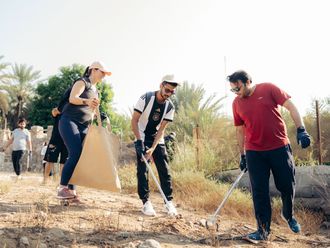Sharjah: Sharjah Civil Defence Department on Tuesday announced they are joining forces, in a committee, with Sharjah Municipality and Sharjah Planning Department to ensure buildings across the emirate are fire safe.
A survey will be carried out of existing residential towers to assess materials used while new buildings set for construction will have to meet new procedures on the chosen materials.
It was also announced that in Sharjah, the use of glass façades will be limited for new buildings that are constructed.
Experts warned, at a Civil Defence press conference in Sharjah Tuesday, that a glass facade can be a fire hazard, helping in the spread of fire and causing more harm than in conventional buildings due to a lack of adequate ventilation.
Brigadier Abdullah Al Suwaidi, Director General of Sharjah Civil Defence Department, said: “The new criteria will be applied to new buildings. The committee will study existing buildings to make an assessment on how best to provide them with fire-safe materials and safety in general.”
Civil Defence have studied recent cases where fires have gutted residential towers and caused fatalities.
Yesterday, officials from Sharjah Civil Defence, representatives from Specified Technologies, Inc (STI) and International FireStop Council (IFC) gathered to discuss recommended materials to be used in buildings to enhance their safety.
The two companies are considered industry leaders in developing firestop products that help stop the spread of fire, smoke, and toxic fumes.
The importance of ensuring efffective firestopping was highlighted,
Firestopping was described as the use of materials which prevent the spread of flames or hot gases through penetrations in fire-rated walls, ceilings or floors.
Often holes were made for items such as pipes, ducts, conduits or cables - firestop products such as silicone sheets or cement mixtures aim to seal such gaps, creating fireproof surfaces.
A representatives from IFC said: “Building fires can turn even the smallest crack around a plumbing drain or the gap between slab and wall into a conduit for flames or deadly gases. Any in-service penetration of a fire-resistive wall or floor assembly compromises its ability to function as a passive fire barrier.
“In recent years, the greater awareness of the importance of firestopping and its life-safety value has been reflected in more detailed state, country, local and regional model buildings codes and in the availability of new firestop products.”
Brigadier Al Suwaidi has also invited designers, architects, engineers and other construction professionals to submit proposals on how to reduce tower fires - which he said have increased recently in Sharjah.
He added: “Throughout the country, federal, state and local government units have adopted various rules which specify minimum requirements as applied to building construction.
“Some adopt a uniform statewide building code, while others delegate code adoption to counties and municipalities within the state.
“Building professionals should remember to consult the local or model building codes applicable to the area of the project, to investigate, and to use common safety sense in assessing the building codes, local customs, and industry standards prior to undertaking any project.”












